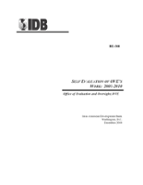Self Evaluation of OVE's Work: 2001-2010
Date
Apr 2011
This self evaluation has been prepared by the Office of Evaluation and Oversight (OVE) in response to a request from Executive Directors to support the work of the Independent Review Panel (IRP), which has been tasked with undertaking an external, independent review of the evaluation function at the Inter-American Development Bank (IDB). Over the 10 years of its existence, OVE has produced a substantial volume of evaluation work, including 47 country program evaluations, 98 other documents in the "RE" series that are sent to the Board for consideration, 27 evaluation reports for the MIF, IIC and Japan Special Fund, and 65 technical reports and working papers. OVE has established formal procedures for the quality control of its evaluations, relying on both internal and external peer reviews of documents sent to the Board. The quality of data available varies across the range of evaluation studies, and some are able to mobilize better empirical information than others. Comments on the quality of OVE documents recorded in the minutes of Board discussions are overwhelmingly favorable. Across a broad range of issues, OVE has issued reports that challenge the empirical basis of prevailing claims regarding the relevance, efficiency, effectiveness, impact, and sustainability of Bank interventions in the region. These challenges have sometimes provoked controversy, but on the whole, it is OVE's view that these controversies have been helpful to the institution in deepening thought and opening up new possibilities. In thinking about the future of the evaluation function at the IDB, this self evaluation highlights the role that an independent, empirically focused, challenging OVE can play in opening up possibilities for institutional change and improvement. While there are clear opportunities for improvement in the work of the Office, (including improved outreach, more explicit and actionable recommendations, explicit and measurable quality standards for evaluation work) it's essential institutional role of challenging complacency deserves to be preserved.



